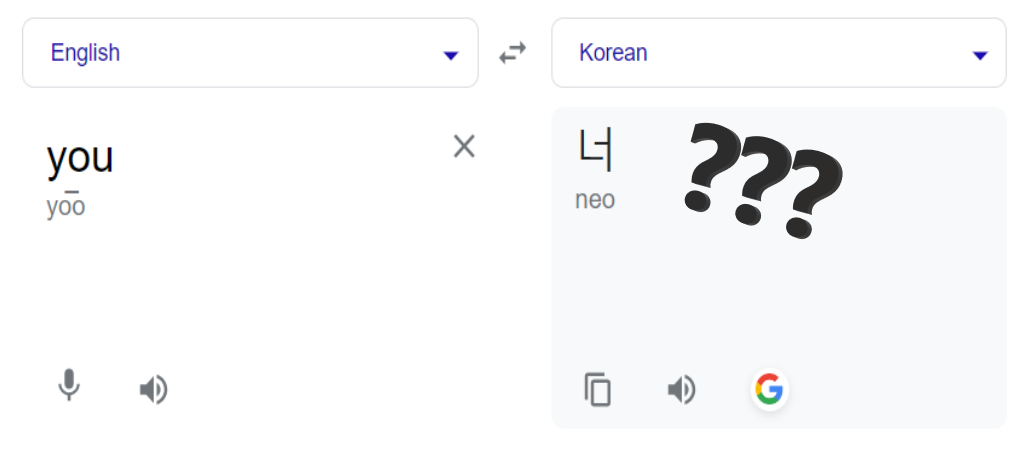What would be one of the most common mistakes that is found from beginner to high beginner students(even lower intermediate, especially if they are self-taught) that might cause you big trouble on an unlucky day in Korea? It is…...(drum roll) how to say ‘YOU’ in Korean. In English, no matter who you are talking to, it is okay to say ‘you’ to the other person. You may call them ‘Mr.’, ‘Mrs.’, ‘professor’, ‘doctor’, ‘captain’ or whatever they should to be called, but after all, you still have to say ‘you’(Mr. Lee, would YOU like to have a cup of coffee?). I have heard some beginners call the other person ‘너’(one of the proofs why Google translate has a long way to go), saying that ‘너’ is what they found online.
‘You’ is a very tricky word in Korean.
As an adult, I probably have less than 10~15 people in my life who I use the word ‘너’ to: Younger sibling, younger cousins, a few friends from school. ‘너’ is an impolite word to say ‘you’, which means you can use it to people who are the same age as you or younger than you, or else you might get into big trouble. It is natural to use ‘너’ to classmates in school without asking their age because they are mostly the same age. However, when you get to know new people as an adult, the way of calling each other depends on the relationships and the situations. I have a younger friend that I made as an adult, I don’t use ‘너’ to call her and I have older friends who never call me ‘너’. Some people like ‘respectful’, others like ‘friendly’ relationships. There is no right answer here. That being said, some non-Koreans get surprised when I tell them that grown ups in Korea have their ‘moment’ to decide the speech style(Sometimes younger one suggests the older one to call him/her ‘너’, other times the older one asks the younger one if it is okay to him/her 너).

To converse in English, you need to use ‘you’ in most sentences. Then, how do we say ‘you’ in Korean? A short answer: they don’t. Koreans simply call each other’s names or social roles like teacher, captain Park, older sister or older brother(even if they are not blood related) etc. When you are obviously talking to each other, you can even omit ‘you’. Can’t imagine how it works? I will give you a couple of examples:
When you are a woman and your female friend is older than you:
*Korean: 언니,/ 뭐 / 해요?
*Literal meaning: Older sis, / what / do?
*English: Older sis, what are you doing? – ‘you’ can be omitted. (In Korean, present tense is also used as present progressive tense but this is for another day.)
When eating out with a colleague named 동은:
*Korean: 저는/김치찌개/먹을게요. 동은 님/은요?
*Literal meaning: I / Kimchi stew / will eat. 동은 님/how about?
*English: I will have Kimchi stew. How about you, 동은?
In ‘동은 님’, 님 is a word showing respect to the other person. It is easy to use! Just add ‘님’ after saying someone’s name(ex. 동은 님, Sally 님, Michael 님). This word has become a common way to call acquaintances, and even colleagues at many ‘young’ companies where the hierarchy and the rank are not as important as the traditional ones. 언니, 오빠(older sister, older brother when you are a woman), 누나, 형(older sister, older brother when you are a man), name+씨(씨 is more casual than ‘님’), 선생님(literally means teacher but it is also used in certain work environments and situations) are some of the most common words to call your Korean friends. When mutually agreed upon, simply calling their name is fine as well.
As mentioned above, if you know the fact that the subject of the Korean sentence tends to get omitted a lot, it would be easier to understand how Koreans talk to each other without using ‘you’ in every sentence.
Was it confusing? Don’t worry too much! Most Korean people will be so impressed with your Korean, they will correct you with a smile on their face even if you made mistakes.



